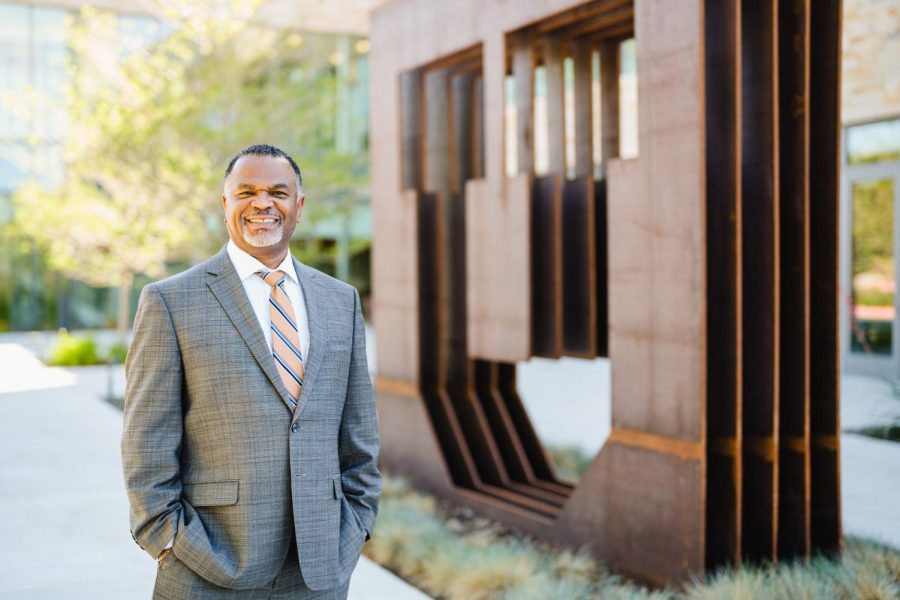Martell Teasley Begins as Senior Vice President for Academic Affairs
February 25, 2022
In January 2022, the College of Social Work’s Dean Martell Teasley became the University of Utah’s interim Senior Vice President for Academic Affairs. His new role will include oversight of academic colleges and programs, as well as student admission and retention.
“My new job is not something I had imagined myself doing in the past,” Teasley said. “The President [Taylor Randall] had asked me to do it. The first thing I did after that was to make sure that my colleagues and fellow deans were okay with it.”
Elizabeth Warner, dean of the College of Law, was ecstatic when she heard the news from Teasley.
“[Teasley] started about a year before me at the University of Utah,” Warner said. “And immediately he was one of the deans who adopted me and helped mentor me. He taught me a lot and really did a great job of on-boarding me. There are a lot of similarities between our two schools because they’re both professional schools focused on helping individuals, so there is a lot of synergies between what social workers and lawyers do.”
Warner said when she first arrived at the U, her and Teasley started talking about opportunities to collaborate between the two colleges.
“And then George Floyd was murdered, I think we both had this horrible collective response of outrage and pain,” Warner said. “We came together and asked, ‘What can we do?’ We knew that we had a platform at the University of Utah because we were both deans at the time, so we began doing a regular race and racism series that began as an opportunity to talk about these sensitive issues. Now we hold these discussions on a quarterly basis, where we pick different books and discuss them. For Martin Luther King Week, for example, we read Robin DiAngelo’s new book “Nice Racism,” which I thought was really impactful because it talks about society’s unwillingness to be uncomfortable with our racist past. Our racist past leads to a lot of ‘nice racism,’ and people aren’t willing to address it.”
Warner said her and Teasley have worked so closely together that its become almost a back and forth dialogue between the two.
“I really appreciate him because every time we do one of these, Dr. Teasley shares an experience from his life that I had not previously known,” Warner said. “He has such a rich life experience, from his military career to living all around the country. I always learn something new from him. I just really enjoy him both as a colleague and a mentor, and then as a collaborator for our racism series. I think the world of him and I am super excited for his new position because I think it’s a wonderful recognition of what he brings as a leader in terms of his lived experience and in terms of his valuable viewpoint.”
Teasley’s leadership technique is the cultivation of his experience as a licensed practical nurse, a social worker and an academic researcher, as well as a decade of service with the U.S. Army.
“Part of my leadership style is just being myself,” Teasley said. “Leadership in this position means doing your homework and taking a deep dive into the information. People can tell when you walk into a room unprepared, so I spend a lot of time preparing for meetings, reading up on things, digging deep into information, getting to the root of problems, and making decisions based on that. Part of my leadership style is also consensus building. We vote on issues in Academic Affairs, and part of my job is figuring out how people will vote ahead of time and why. That means talking to people and understanding their viewpoints. Sometimes you don’t win, but you still have to count the votes.”
Eric Garland, associate dean for research in the College of Social Work, has experienced Teasley’s leadership firsthand.
“Speaking broadly, I would describe Dr. Teasley as a born leader,” Garland said. “He’s somebody with great charisma and really deep wisdom that comes from having a remarkably wide range of life experiences. He is also a brilliant systems thinker with a tremendous amount of social intelligence, and he really understands people’s needs and what drives them. He’s one of the coolest people that I know, and he is truly a master when it comes to world history, world politics and social-economic systems. He’s had this amazing life, and I think he’s someone with a clear vision.”
In his new position, Teasley’s vision now focuses on advancing the U’s position as a premier academic institution through elevating the student experience.
“I always wanted to leave an indelible mark on the institutions I work with,” Teasley said. “In the College of Social Work, we had a ‘Five-Year Plan’ put into place, and in my time as Dean, we had made sufficient work towards our end goals. As the Senior Vice President for Academic Affairs, I am now concerned with teaching practices for the entire university.”
Teasley said his priority to create an exceptional educational experience for students is a goal that he has borrowed from his time as dean.
“Now, I want to make that a goal for the entire university and it is something I am trying to galvanize everyone around,” he said. “I think this is something that all [faculty] are mindful of, but there are some small things that need to happen.”
One example of this that Teasley talked about is making sure students meet with advisors and have a roadmap. He said research shows that students have greater success when they know where they are going.
“That makes a huge difference, but sometimes we take that for granted,” Teasley said. “Making sure that students meet with their advisors is one component of a model I refer to as ‘Quality Assurance from the Application Process to the Handshake at Graduation.’ At each stage, we want to make sure students have a good experience, and that goes from registering for classes and admission to the university to things like assignments being posted to Canvas in an organized way so that students have an expectation of the syllabus and assignment due dates. All of those things make a huge difference to the student experience.”








